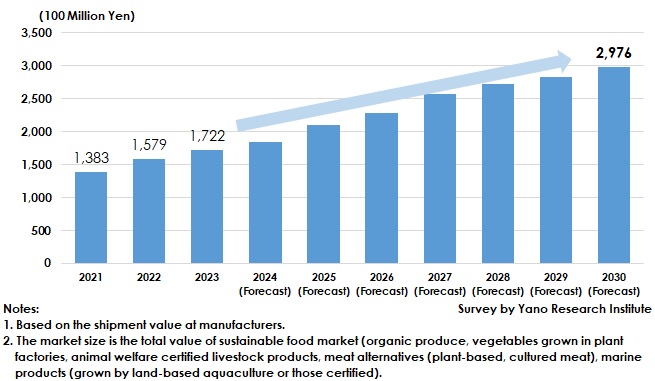No.3489
Sustainable Food Market in Japan: Key Research Findings 2024
Sustainable Food Market for 2023 Generated 172,200 Million yen
Yano Research Institute (the President, Takashi Mizukoshi) carried out a survey on the sustainable food market in Japan and found out the market conditions, trends of market players, and future perspectives.

Market Overview
The sustainable food market in 2023 reached 172,200 million yen by shipment value at manufacturers.
The environment surrounding the industries of agriculture, fishery, and livestock has been changing, which is affecting food production in recent years. Since 2022, global political instability has brought about uncertain supplies and soaring prices for food. Enhancement of food security and production of sustainable food have become the issues worldwide.
In the situation where sustainability-conscious food production and consumption are required from the long-term view, produce such as organic products, vegetables grown by plant factories, seafood and marine products that have acquired certificates from Aquaculture Stewardship Council (ASC), Marine Stewardship Council (MSC), Marine Eco-Label Japan Council (MEL), or those that have grown by land-based aquaculture, livestock products bred by the methods and in the environment that meet animal welfare breeding, and meat alternatives (plant-based, cultured meat) are attracting attention.
Noteworthy Topics
Higher Consciousness of Ethical Consumerism
Ethical consumption refers to an idea to contribute to the society against environmental or social problems through those consumer activities such as choosing environmentally friendly products in terms of the types of raw materials and the production methods.
The idea of ethical consumption is related to Sustainable Development Goals (SDGs) that have become international goals. In recent years, both consumers and producers have deepened the understanding on efforts to realize sustainable society through environmental preservation with SDGs in mind.
SDGs, adopted by all United Nations Member States in September 2015 as the worldwide goals to be attained in the period between 2016 and 2030, comprise 169 targets (target criteria) set according to the 17 goals and challenges that must be addressed for realizing sustainable societies.
Of these 17 targets, the twelfth goal “Ensure sustainable consumption and production patterns” aims to change the production and consumption patterns to reduce waste. Because current production and consumption patterns force excess burdens to the global environment, and repeating these patterns may lead to deplete of valuable resources such as fossil fuels and metals from the earth. The concerns have brought about the idea of ethical consumption that has gathered attention. Continuing ethical consumption is regarded to be the effective method for attaining the goal of “Ensure sustainable consumption and production patterns”.
Future Outlook
Organic produce has increased the variety sold at supermarkets and retailers, expanding the volume distributed. Hereafter, spread at lower prices is expected to start, as stable supplies become available via popularization of cultivation techniques and increase in producers.
Demand for vegetables from plant factories both for commercial and retail is increasing, because their procurement in volume and quality is stable, while vegetables grown outdoors have often affected by the recent inclement or extreme weather.
Certified marine products have seen increase in those businesses obtaining certificates, as more people have deepened considerations on fishery resources and environment, associated with the improved awareness of SDGs.
As land-based aquaculture is the method that ensures sustainability because it hardly affects oceans and seas, unlike usual aquaculture, marine products grown by it meet the requirement by convenience stores, etc. that focus on sustainable material procurement.
Plant-based meat alternatives have increased awareness among consumers as they have become available at retailers and in menus at restaurants. Cultured meat is likely to see market formation in the latter half of 2020s, as the basic technology for production to complete and the cost reduction efforts to bear fruits are expected by the mid-2020s in association with the Japanese legislation on food safety and indication rules being in place.
Though the market of animal-welfare certified livestock products is currently very limited, it is likely to increase in the mid to long term view. The market is already growing in the US and Europe, while the market in Japan lags. Proliferating the ideas on the appropriate breeding environment for livestock to consumers may contribute to the market expansion.
The market of sustainable food in Japan is projected to reach 297,600 million yen by 2030, based on the shipment value at manufacturers, as social demand for sustainability increases in Japan.
Research Outline
2.Research Object: Companies and organizations that deal with sustainable foods, the Ministry of Agriculture, Forestry and Fisheries, business groups, industrial magazines/papers, etc.
3.Research Methogology: Face-to-face interviews (including online) by expert researchers and surveys via telephone/email, literature research
The Sustainable Food Market
The sustainable food market refers to foods made from produce, livestock, marine products, etc. that have been grown or bred via environmentally friendly and sustainable production methods.
The market size is the total values of produce (organic produce, vegetables grown in plant factories), livestock (animal welfare certified), meat alternatives (plant-based, cultured meat), marine products (grown by land-based aquaculture, certified fisheries (MSC, ASC, MEL, etc.))
<Products and Services in the Market>
Produce (organic produce, vegetables grown in plant factories), livestock (animal welfare certified), meat alternatives (plant-based, cultured meat), marine products (grown by land-based aquaculture, certified fisheries (MSC, ASC, MEL, etc.))
Published Report
Contact Us
The copyright and all other rights pertaining to this report belong to Yano Research Institute.
Please contact our PR team when quoting the report contents for the purpose other than media coverage.
Depending on the purpose of using our report, we may ask you to present your sentences for confirmation beforehand.